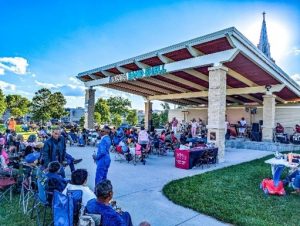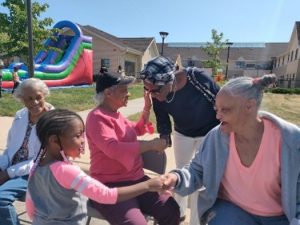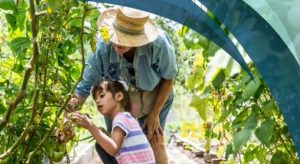 Summer is a perfect time for engaging multiple generations in fun, meaningful outdoor activities. Intergenerational games, gardening, storytelling, arts, and nature walks, as well as more intensive summer camps, provide opportunities for social connection, physical activity, and the transmission of traditions and knowledge. This issue highlights examples of summer programs and provides resources that can help practitioners develop high-quality, relationship-based activities.
Summer is a perfect time for engaging multiple generations in fun, meaningful outdoor activities. Intergenerational games, gardening, storytelling, arts, and nature walks, as well as more intensive summer camps, provide opportunities for social connection, physical activity, and the transmission of traditions and knowledge. This issue highlights examples of summer programs and provides resources that can help practitioners develop high-quality, relationship-based activities.
Sign up to receive future issues of this newsletter – select Shared Site Learning Network (Quarterly Alerts and Information on Resources and Training)
Program Highlights
Odindi Youth Action Village Intergenerational Summer Camp
In Ypsilanti, Michigan, the Odindi Youth Action Village (OYA), created by father and son Akinbambo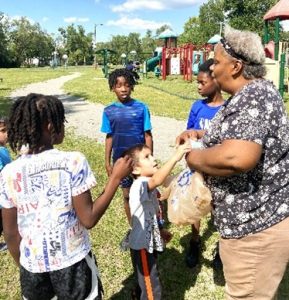 and Akintunde Oluwadare, brings elders and youth together to create a strong West Willow neighborhood and close generational gaps.
and Akintunde Oluwadare, brings elders and youth together to create a strong West Willow neighborhood and close generational gaps.
Last year, OYA launched a free 12-week summer camp to foster stronger community bonds, provide structured activities for diverse age groups, and enhance the overall well-being of West Willow’s residents. With input from youth and elders in the community, the summer camp was designed to promote health, wellness, community cohesion, and intergenerational collective work.
Originally held every Sunday from 2-3:30, the camp now operates Tuesdays through Fridays, 5-7 pm. Each session begins with a circle of trust that provides participants with an opportunity to share their accomplishments and get to know each other. From there, community pods (small groups led by elders) discuss a different question each week (e.g. How do you deal with stress?). The elders and youth then participate in a variety of activities, including yoga, arts and crafts, dance, basketball, football, and soccer. There is also an area where people can sit together for informal interaction and observe the activities.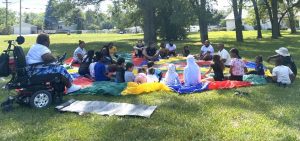
Storytelling and a strengths-based approach are key approaches used by staff to build trust across ages. In addition to the summer camp, youth and elders plant vegetables and fruit in a community garden, engage in storytelling and advocacy sessions, and engage in a variety of arts activities.
Odindi Village recently purchased three plots of land on which they plan to build an intergenerational community center.
For more information, contact: Akinbambo Oluwadare: bambo@oyavillage.org or Akintunde Oluwadare: akin@oyavillage.org
National Parks and Recreation Association Intergenerational Initiative
The National Parks and Recreation Association, with funding from the RRF Foundation for Aging, is engaging in an initiative to expand the availability of equitable and inclusive intergenerational programming in Parks & Recreation agencies and leverage their spaces to support social and intergenerational connectedness. To scale intergenerational connection interventions and approaches across the park and recreation field, NRPA has awarded grants to the following geographically diverse local agencies:
- The Lexington Recreation and Community Programs Department in Lexington, Massachusetts, will engage youth and older adults in Sow and Grow Together, an intergenerational gardening project that will be incorporated into their summer day camp. Youth and elders will come together to plant, nurture, and harvest vegetables, cultivating both food and connection.
- The City of Lakewood, Ohio is engaged in a collaborative effort to transform an underutilized outdoor space at the Cove Community Center into an intentional, inclusive space called “Common Ground at Cove.” It will include raised garden beds, plant Identification along a walking path, comfortable seating with usable surfaces, shade structures, and a nature play area. The redesigned space and additional outdoor programming focused on co-creating, bocce, and gardening will promote shared experiences across generations.
- The Riverdale, Illinois Park District is developing a drop-in social center for older adults that will promote intergenerational activities by partnering with young people to create and maintain a community garden and engaging older adults as mentors in their summer camps.
- The City of Chula Vista Parks and Recreation in California is developing an intergenerational technology program with local high school seniors to enhance the capacity of older adults to work on computers and smartphones and utilize social media. The program also encourages intergenerational bonding through recreational games and activities, where teens and seniors can team up, learn from one another, and build meaningful connections.
These pilot projects will be evaluated, and best practices will be identified that can be replicated in Parks and Recreation agencies across the country.
For more information, contact Natalia Ospina: nospina@nrpa.org
Intergenerational Gardening
San Diego County Intergenerational Gardens
There are nine intergenerational gardens in San Diego County, two of which are at community centers in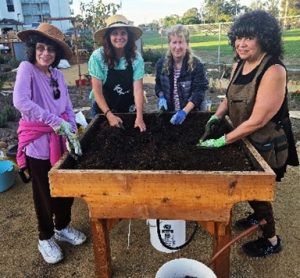 County parks. During the past year, the County of San Diego’s Aging & Independence Services, initially supported by Older Adults Recovery and Resilience funding from the California Department of Aging, has provided gardening supplies as well as garden and nutrition instructors to host intergenerational workshops focusing on basic gardening, native plants, healthy soil, and rock painting. Community members of all ages are engaged in garden workdays and events that intentionally promote social connectedness.
County parks. During the past year, the County of San Diego’s Aging & Independence Services, initially supported by Older Adults Recovery and Resilience funding from the California Department of Aging, has provided gardening supplies as well as garden and nutrition instructors to host intergenerational workshops focusing on basic gardening, native plants, healthy soil, and rock painting. Community members of all ages are engaged in garden workdays and events that intentionally promote social connectedness.
For more information, contact Pam Plimpton: pam.plimpton@sdcounty.ca.gov
Partridge Creek Farm
Partridge Creek Farm, situated in Ishpeming, Michigan, is a non-profit organization established in 2013. Their initiatives include extensive educational programs along with the management of four community garden sites and one 3.75-acre farm site. It provides local food access and intergenerational learning opportunities to connect the community with its food and one another. The Partridge Creek Community Farm is the 3.75-acre farm site located behind a Senior Housing development and is very close to the Ishpeming Senior Center and a middle/high school. During the summer, there is a weekly Farm Stand which attracts older adults and families. In addition, Skill Share workshops are offered in which community members of all ages share specific skills/ knowledge (e.g., fermentation, making kale chips, cooking). Plans for the fall include expanding the partnership between Ishpeming High School and the Senior Center.
For more information, contact Mary Antonia Andronis at mary@partridgecreekfarm.org
Intergenerational Gardening Resources
9 Intergenerational Garden Projects for Learning That Bridge Generations Together
This Paths of Learning guide showcases nine creative garden projects that unite youth and elders in outdoor classrooms. From raised beds and pollinator patches to art, storytelling, and food‑to‑table activities, participants learn from each other, share cultural traditions, and build meaningful connections, all while growing food and environmental stewardship together. Access the resource.
Intergenerational Gardening: Good For Gardeners of All Ages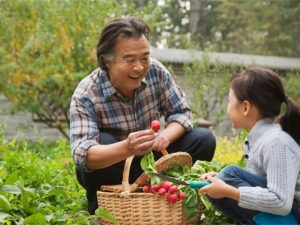
Intergenerational gardening lets older people and children come together for their mutual benefit. Intergenerational gardening is a great way for children to learn and offers older adults an important role in mentoring and teaching them, as well as some fun and pleasant company. Access the resource.
Roots and Shoots Toolkit for Intergenerational Gardening
The aim of this toolkit is to sow a seed of thought and give some basic tips on developing intergenerational relationships through gardening. Roots & Shoots is an intergenerational gardening programme that has worked with several community allotment projects by bringing young people and volunteers together with isolated and lonely elderly people in Leicester, England. Access the resource.
Growing the Next Generation: Grandfriends and Gardening
In addition to sharing and preserving cultural traditions, there are multiple benefits to intergenerational gardening, including:
- A welcoming environment to share cultural and life experiences,
- New and renewed relationships between children and older adults, which can address previously held beliefs and stereotypes,
- Improved physical and mental well-being in participants, particularly quality of life for older gardeners,
- Enhanced interest in gardening for younger participants, and
- Opportunities to explore and develop skills such as reading, math, science, social studies, and social emotional skills.
Growing Connection: Gardens that Bridge Generation Gaps
Thoughtfully designed gardens have a unique ability to dissolve age barriers, creating spaces where wisdom meets wonder and stories are exchanged alongside seeds. The most successful intergenerational gardens incorporate distinct activity zones that invite participation across age groups. These thoughtfully crafted areas serve as conversation starters and skill-sharing opportunities. Access the resource.
Seeds of Wisdom: How Baby Boomers and Gen Z Cultivate the Future of Home Gardening Together
Intergenerational dialogue is key to understanding and preserving horticultural wisdom. Baby boomers, with their wealth of experience, are planting seeds of knowledge in the hearts of youngsters eager to learn about sustainable practices. Urban gardens serve as vibrant classrooms where shared experiences and diverse perspectives flourish. Access the resource.
Planting Together: Ageless Lessons from Seniors Paving the Way for Young Urban Gardeners
Beyond yielding fruitful harvests, gardening serves as an avenue for personal growth, a sentiment profoundly resonant across generations. The act of nurturing living organisms fosters empathy as individuals learn to attune themselves to nature’s rhythm. This shared experience creates fertile ground for building mutual understanding between older and younger enthusiasts bridging gaps not only between age groups but also between different perspectives and lifestyles. Access the resource.
Project S.O.W: Food Gardening with Justice in Mind
Cornell CALS introduces Project S.O.W. (Seeds of Wonder), a teen gardening curriculum that blends hands-on food growing with food-justice education. Through four engaging units, youth explore gardening, community, equity, and ecological resilience. Designed to spark curiosity, leadership, and social change—all through the power of the garden. Access the resource.
Know, Sow, Grow – Garden Lessons for Kids
The Edible Schoolyard Project offers Know, Sow, Grow, a free six-lesson curriculum for PreK–8 students. Through hands-on activities, exploring seed anatomy, roots, flowers, planter boxes, reading seed packets, and direct seeding, students build gardening skills, science vocabulary, and ecological awareness. Designed for both in-class and remote learning, it’s an engaging way to deepen plant science and literacy in any classroom. Access the resource.
Buds’n’Blooms: Where Generations Grow Together (Video)
In Fremantle, Australia, a unique playgroup is connecting young children and seniors through gardening, play, and shared meals. Buds’n’Blooms blends nature-based learning with intergenerational joy—helping kids get messy, elders stay social, and everyone feel part of something special. Access the resource.
Inter-generational Gardening Soul to Soul (Video)
The Alliance for African American Health in Central Texas is cultivating wellness through intergenerational gardening teams—pairing youth, adult mentors, and elders to grow backyard gardens. Alongside gardening, youth gain financial literacy and food justice education, while the harvest increases access to fresh, nutritious food and strengthens community bonds. Access the resource.
Intergenerational Summer Camps
Oxford Crossings Intergenerational Summer Camp
At the Oxford Crossings retirement community in Langhorne, Pennsylvania, a one-week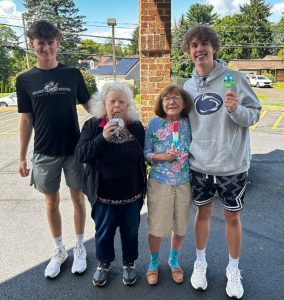 intergenerational summer camp is offered to 15-20 middle school students and 25 older adults. At the beginning of the week, older adults from the retirement community participate in an orientation that focuses on expectations and effective ways to interact with youth. Fostering mutual respect and empowering youth are key components. Youth are drawn from the broader community and Oxford Crossings staff. They also engage in initial training to sensitize them to aging issues and help them develop effective ways to communicate with older adults. The curriculum for the week is arts- focused. Following a meet and greet each morning, participants engage in storytelling, poetry, and music sessions that culminate in a final event performance. The summer camp builds upon other school-based programs that involve partnering with local museums and schools.
intergenerational summer camp is offered to 15-20 middle school students and 25 older adults. At the beginning of the week, older adults from the retirement community participate in an orientation that focuses on expectations and effective ways to interact with youth. Fostering mutual respect and empowering youth are key components. Youth are drawn from the broader community and Oxford Crossings staff. They also engage in initial training to sensitize them to aging issues and help them develop effective ways to communicate with older adults. The curriculum for the week is arts- focused. Following a meet and greet each morning, participants engage in storytelling, poetry, and music sessions that culminate in a final event performance. The summer camp builds upon other school-based programs that involve partnering with local museums and schools.
For more information, contact Ricky Pena, VP of Life Enrichment at Marquis Health Consulting Services: rpena@mqshealth.com .
El Buen Samaritano Juntos Summer Program
At El Buen Samaritano in Travis County, Texas, middle school youth and older adults come together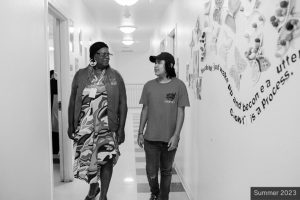 during the summer to build connections through storytelling, photography, and digital literacy. The Juntos program, initially funded through the St. David’s Foundation, focuses on sharing stories using digital photography and is fully integrated into El Buen’s summer program. This year, two 4-week summer sessions are offered. Once a week, during the last two hours of camp, six older adults work 1:1 or 1:2 with 15 middle school students to share stories about their lives. A facilitator provides prompts to help begin conversations. Both middle school students and older adults receive training in digital and computer literacy, enabling them to explore the world of photography through hands-on sessions. Through the lens of a camera, they discover a common language that transcends age. After sharing a number of stories, each pair selects one to record. They are asked to bring the story themes to life through photos that they take together. El Buen provides digital cameras for each pair. At the end of each day, a reflection session is held to give participants an opportunity to share their learnings and give feedback. Providing prompts, engaging a person with expertise in photography to provide assistance, and flexibility were identified as key to the success of this program.
during the summer to build connections through storytelling, photography, and digital literacy. The Juntos program, initially funded through the St. David’s Foundation, focuses on sharing stories using digital photography and is fully integrated into El Buen’s summer program. This year, two 4-week summer sessions are offered. Once a week, during the last two hours of camp, six older adults work 1:1 or 1:2 with 15 middle school students to share stories about their lives. A facilitator provides prompts to help begin conversations. Both middle school students and older adults receive training in digital and computer literacy, enabling them to explore the world of photography through hands-on sessions. Through the lens of a camera, they discover a common language that transcends age. After sharing a number of stories, each pair selects one to record. They are asked to bring the story themes to life through photos that they take together. El Buen provides digital cameras for each pair. At the end of each day, a reflection session is held to give participants an opportunity to share their learnings and give feedback. Providing prompts, engaging a person with expertise in photography to provide assistance, and flexibility were identified as key to the success of this program.
For more information, contact Emily Ledesma: ELedesma@elbuen.org
Link Generations Summer Programs
Link Generations in Bethesda, MD, educates middle and high school students about aging and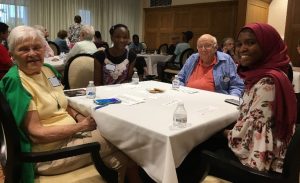 facilitates intergenerational programs. During the summer, it offers a number of activities, including:
facilitates intergenerational programs. During the summer, it offers a number of activities, including:
- A five session storytelling series that brings together high school students and people with early dementia in an adult day care center. In small groups, students and older adults engage in discussions about music, travel, and other topics that spark conversation.
- An Intergenerational Graphic Novel Book Club that meets three times this summer at the Gaithersburg Public Library. Middle and High School students meet with older residents from Asbury Methodist Village to discuss graphic novels that are selected by the librarian.
For more information, contact Lori Marks: lori@linkgenerations.org
ARECMA Summer Camp
The Recreational and Educational Community Association of Barrio Mariana de Humacao (ARECMA) is a volunteer-run organization in Puerto Rico that promotes individual and collective social responsibility across generations. It serves the residents of the Mariana neighborhood in Humacao, Puerto Rico, by providing services and facilities that bring residents of all ages together. This June, ARECMA offered a summer camp on 15 acres of land, with five elders and a college student serving as facilitators. Most of the elders were retired teachers. Every day from 9 am to 2 pm, elders and youth engaged in a range of arts and health-related activities and shared stories about the history of this special community. The elders were very integrated into all aspects of the camp, resulting in a family-like atmosphere. Labor Day weekend, the traditional Festival de la Pana will be held. This community celebration brings together extended families for a weekend of music, artisania (crafts), and food.
For more information, please contact Zoelis Vega–Vega at zvegavega@arecma.org.
Video: https://www.youtube.com/watch?v=6VnF5MJYcN8
St Ann Center for Intergenerational Care Indaba Nights
St. Ann’s Center in Milwaukee, WI offers child and adult day care as well as a range of health and wellness services to the community. During the summer months, in addition to regular activities between young children and older adults, St Ann’s Bucyrus Campus sponsors Indaba Nights in their Bandshell. This venue is a safe place where extended families from the community come together to enjoy bands playing jazz, blues, old school, and African music. Several hundred people of all ages participate in these Wednesday night gatherings
For more information, contact: Gloria Miller at gmiller@stanncenter.org
Gramping
“Gramping” is a free, overnight camping experience for kinship families that is sponsored by the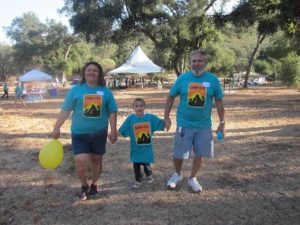 County of San Diego’s Health and Human Services Agency (HHSA) and the Department of Parks and Recreation (DPR). The event was dubbed “Gramping” to capture the concept of camping with one’s grandparents or other kinship caregivers. The first Gramping event, attended by 18 kinship caregivers and 30 children, was held in September 2017 at Dos Picos County Campground in Ramona, CA. Four events have occurred since that time. The 2025 Gramping overnight event was held in May and included the following activities: games and crafts, a gentle, guided hike, a glow-stick “Dance Off”, S’mores around the campfire, and a tree-planting activity. Feedback from various events and questionnaires has indicated that many kinship families are eager for more activities that strengthen family bonds, especially since many of the children have been through trauma and disruption in their lives.
County of San Diego’s Health and Human Services Agency (HHSA) and the Department of Parks and Recreation (DPR). The event was dubbed “Gramping” to capture the concept of camping with one’s grandparents or other kinship caregivers. The first Gramping event, attended by 18 kinship caregivers and 30 children, was held in September 2017 at Dos Picos County Campground in Ramona, CA. Four events have occurred since that time. The 2025 Gramping overnight event was held in May and included the following activities: games and crafts, a gentle, guided hike, a glow-stick “Dance Off”, S’mores around the campfire, and a tree-planting activity. Feedback from various events and questionnaires has indicated that many kinship families are eager for more activities that strengthen family bonds, especially since many of the children have been through trauma and disruption in their lives.
For more information, contact Pam Plimpton: pam.plimpton@sdcounty.ca.gov
Intergenerational Summer Camp Resources
Intergenerational Music-Making: How Music Connects Generations
In this blog, the American Camp Association highlights how engaging different generations in outdoor music can encourage communication and understanding. Access the resource.
Play, Percussion and ‘Post-Age’ Pedagogy: The Positive Effects of Intergenerational Music-Making
This white paper by Percussion Play highlights how outdoor percussion play brings generations together, boosting well-being, connection, and community through shared musical fun. Access the resource.
Intergenerational Outdoor Activities
Intergenerational Games
Intergenerational Games are designed to promote health and physical fitness, as well as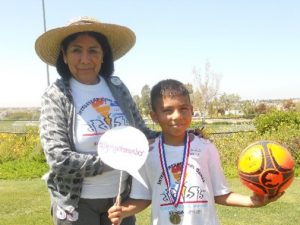 intergenerational relationships among older adults and children. The Intergenerational Games in San Diego were created as an innovative approach to address health and social issues in the community, such as childhood obesity and the high rate of older adults diagnosed with diabetes and heart disease. Active older adults (age 50+) and elementary and/or middle school students pair up for a half-day of educational and physical activities. Each participant receives a t-shirt with the design of an Olympic-style torch, suggesting physical activity and healthy lifestyles. The slogan, “Everyone’s a Winner,” reminds participants that active and healthy choices are not reserved just for Olympic athletes but are within the reach of everyone—young and older. The intergenerational teams engage in a variety of fun, non-competitive, and educational activities. After participating in activities, the older adult and youth participants enjoy lunch together.
intergenerational relationships among older adults and children. The Intergenerational Games in San Diego were created as an innovative approach to address health and social issues in the community, such as childhood obesity and the high rate of older adults diagnosed with diabetes and heart disease. Active older adults (age 50+) and elementary and/or middle school students pair up for a half-day of educational and physical activities. Each participant receives a t-shirt with the design of an Olympic-style torch, suggesting physical activity and healthy lifestyles. The slogan, “Everyone’s a Winner,” reminds participants that active and healthy choices are not reserved just for Olympic athletes but are within the reach of everyone—young and older. The intergenerational teams engage in a variety of fun, non-competitive, and educational activities. After participating in activities, the older adult and youth participants enjoy lunch together.
https://www.programsforelderly.com/social-intergenerational-games-activities.php#google_vignette
For more information, contact Jennifer Overman: joverman@san-marcos.net
Pickleball and Nature Walk
Once a week at the Fallbrook Community Center, older adults from the Fallbrook Senior Center share their love of pickleball with local kids ages 7 and up. After a quick lesson, they team up to play, then enjoy a snack together, creating friendships across generations while staying active. About 10-12 older adults and 15-20 children are participating in the program.
Last August, the Community Center also hosted its first intergenerational nature walk, where about 20 high school students and 15 older adults explored local trails, played lawn games, and relaxed with yoga in the park. Thanks to the enthusiastic response, more intergenerational activities are on the way!
To learn more, contact Nancy Santillan at Nancy.Santillan@sdcounty,ca,gov.
Intergenerational Outdoor Activities Resources
Growing Together Outdoors: Uniting Generations in Play and Exploration
In today’s digital age, where screens dominate our daily lives and indoor activities often take precedence, the concept of intergenerational outdoor play holds significant importance. This form of play brings multiple generations together and fosters numerous physical, emotional, and social benefits for everyone involved. Intergenerational outdoor play refers to activities that involve individuals of different age groups engaging in play and recreation together in outdoor settings. This could involve grandparents playing with grandchildren, parents joining in activities with their children, or community members of varying ages coming together for shared outdoor experiences. The critical aspect is the participation of multiple generations in outdoor play, which can encompass various forms such as sports, games, gardening, hiking, or simply spending time outdoors. Access the resource.
This newsletter is presented as part of Generations United’s Shared Site Learning Network which is made possible with support from The Eisner Foundation.
